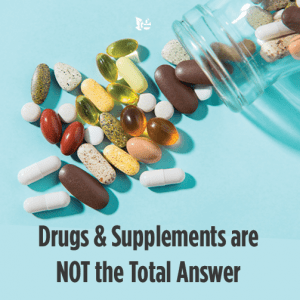10 Mar Understanding and Resolving Digestive Issues

 Paul A. Goldberg, MPH,DC,DACBN,DCBCN
Paul A. Goldberg, MPH,DC,DACBN,DCBCN
The Goldberg Tener Clinic
Chronic Disease Reversal
Digestive issues are the most common problems seen by family physicians. Over the forty-five years I’ve been working with patients with chronic health issues, most have had digestive disturbances even if they were not the chief complaint. Gastrointestinal issues can usually be resolved with a thorough investigation and hard work aimed at improving the patient’s overall health. They rarely, however, resolve simply by naming symptoms and swallowing pills of any type. If you have been led down the pill path, you’ve been deceived.
It is understandable why patients might believe their digestive issues can be solved by simply naming them and then swallowing an assortment of pills. Our culture is pill driven. Virtually all “treatments” through physicians are via the prescribing of pills. Despite the damning evidence of the common and serious side effects caused by the drugs including steroids, antibiotics, “Biologicals”, anti-depressants, anti-anxiety, antacids, narcotics, laxatives, opiates, etc., drug prescribing continues to be the mainstay of medical practice. Ironically these same drugs, when given to patients with digestive disorders, often are a significant contributing factor to gastrointestinal issues.
Below is a short video explaining the problems that can be caused by taking antacids.
There are those who don’t take drugs but swallow other types of pills, capsules and tablets from “Alternative Practitioners.” Patients may feel more at ease with these pills since they are touted as being “natural”. These are also easily purchased from Costco, Walmart, Amazon and other internet vendors in massive amounts.
The emergence of the “Complimentary/Functional/Integrative Physicians” (all relatively meaningless titles) who were, in the past, critical of non-medical approaches, are now eager to push both prescription drugs and a plethora of “supplements” (see article “The Facade of Functional and Alternative Medicine”). They are urged and motivated to do so by supplement companies who court their favor in similar ways as the drug companies court standard medical physicians. In 2020, there were over five hundred supplement companies in the U.S. alone pushing 85,000 different supplement products comprising an annual multi-billion-dollar market.
Chasing Symptoms With Pills While Ignoring Causes
We don’t develop digestive ills due to a deficiency of pills and pills are rarely the solution to our digestive ills. Digestive issues, whether taking the form of bloating, gas, skin issues, constipation, diarrhea, ulcers, cramping and/or inflammatory conditions, etc., are a threat to the well-being of the body and the longer they persist the more far reaching their detrimental effects will be.
The GI tract starts with the mouth and ends with the anus with the accessory organs of the liver, pancreas and gallbladder interfacing directly with them. Through a complex set of mechanical, chemical and hormonal interactions, foodstuffs are gradually broken down into their component amino acids, fatty acids and sugars. Nutrients are absorbed and wastes are eliminated via the liver, kidneys, and bowels. This transformation in healthy persons is a smooth (though chemically/physiologically a complex process) that results in creating energy for the body to utilize as well as raw material for repair of tissues, maintenance and growth.
Importantly, arriving at the correct solutions for a patient with GI issues requires viewing the entire person, doing thorough detective work through examination and laboratory studies and developing a comprehensive program for the patient to undertake that addresses causal factors and supplies all the essentials of health.
Do chronic digestive issues disappear by swallowing pills? Does the gas, bloating, chronic diarrhea, constipation, bleeding of the bowels, spasms and cramps, associated joint and muscle pains and skin disorders fade into the past through pill taking? Rarely. If on occasion the taking of pills or injecting of drugs diminishes symptoms, it is usually a temporary improvement that leads to more serious issues down the road. Below is a video interview with one of our patients that experienced this common scenario prior to coming to our clinic and recovering her health.
The health of the GI tract is dependent on the health of the body as a whole and visa versa.
In my work as a clinician and as a Professor of Clinical Nutrition and Gastroenterology for over forty years, I along with my colleague Dr. David Tener have worked with thousands of patients suffering with digestive issues. By addressing each one as an individual (rather than based on the disease name assigned) we have witnessed their digestive issues dissipate and their health return (click here to see examples).
Did it matter what the name of their disease was called? Not nearly as much as it mattered why they had that particular disease. Genetic Factors? Dietary habits? Emotional Stress? Drug side effects? Supplement abuse? Poor hygiene? Iatrogenic Factors (physician caused)? Environmental Toxins? Nerve related Motility Issues? Lack of sleep and rest, overeating or other factors leading to GI exhaustion? The possibilities are numerous. It is only by taking real time with the patient that the etiological (causal) factors can be sorted out and addressed. There is good reason we take sixty to ninety minutes with each new patient just in interviewing them and limit ourselves to seeing no more than five patients per day. People and their health/digestive are complex and it takes time and focus on the patient to arrive at the causal factors that need to be uncovered and addressed.
Patients told that their digestive issues are caused by such popular titles as “SIBO” or “Irritable Bowel Syndrome” are also being misled. Yes, patients labeled with Irritable Bowel Syndrome do have irritable bowels. Yes, SIBO (small intestinal bowel overgrowth) does exist and we often test for it. Behind each case of SIBO, Irritable Bowel Syndrome or other medical title, however, are different causal factors for each patient that must be sorted out rather than just reaching for an antibiotic, probiotic, essential oil or whatever other universal fix is popular at the moment. This is the way to a truly successful long-term outcome.
Regarding supplements…they have their place but it is a limited one. No one’s health restoration program should be focused on supplements alone.
Steps You Can Begin to Take NOW
There are four simple steps that all patients should take and can take on their own whether they are consulting a doctor or not.
- Avoid overeating. Don’t eat till you are entirely full. Placing less work on the GI tract is often critical to allow it to regain its function. Benjamin Franklin used to say that “We live on one third of what we eat and the doctor lives on the other two thirds.”
- Chew well. Your stomach has no teeth and cannot adequately compensate for a lack of proper mastication. Chewing thoroughly also reduces the amount of work your GI tract has to perform thus enabling it to better recover from whatever the issue(s) might be.
- Avoid eating under high levels of stress. Your emotions have an extremely strong influence on your GI tract. If your mind is not in a good place neither will your GI tract regardless of what you choose to ingest.
- Keep your diet simple. No need to eat numerous and complex food mixtures at a single meal. The simpler the diet the simpler the digestion.
Many serious disease conditions begin with chronic digestive disturbances. If you have chronic digestive issues, proper identification of causal factors is essential to the restoration of health. Do not simply rely on prescription or over the counter pills and supplements.
Contact us if you would like our help in analyzing your health issues and restoring your digestive and overall well-being. In the interim, apply the four suggestions above. You may be surprised at the difference simple steps like these often make!
Related Articles
- Reversing Digestive Disorders: An Effective Causal Based Approach
- Crohn’s Disease and Ulcerative Colitis: Health Restoration as Opposed to Disease Treatment
- Irritable Bowel Syndrome: A Meaningless Diagnosis
- Bacterial Overgrowth of the Small Intestine (SIBO)
- Eosinophilic Esophagitis, Gastritis and Colitis
- Problems with Ant-Acids
- Serious Considerations Regarding Colonoscopy
- The Perils of Laxatives, Enemas and Colonics





No Comments